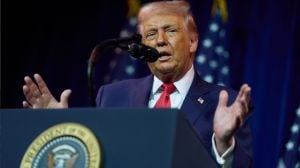60 Indians shun more saving: Survey
MUMBAI, APR 10: A survey conducted by Mastercard International has revealed that the average amount set aside monthly for pension funds b...

MUMBAI, APR 10: A survey conducted by Mastercard International has revealed that the average amount set aside monthly for pension funds by Indians was as low as US 100 or less while 60 per cent of the Indians are not saving more money because of the economic downturn.
The semi-annual Asian Ideals survey studied how Asians plan for and view their retirement. One out of four Asians believe that having US 100,000 to US 300,000 can ensure a comfortable retirement, however, in countries such as Singapore, consumers believed that they need at least 1 million to 2 million.
Though the favoured average age of retirement for Indians was 56-60 years, most of the Indians said that they needed only 100,000 to retire comfortably. While 47 per cent of Indians interviewed have a pension fund, an equal number did not have any pension funds. Most of the people in India put aside less than 100 for pension whereas as people in Singapore saved an average of US 750 to US 1,000 per month towards this.
Asignificant number of consumers from China 32 per cent, Thailand 30 per cent and Indonesia 29 per cent need US 1,00,000 or less to retire comfortably. However, 26 per cent of Indonesians and 12 per cent of Singapore citizens said they would need over 5 million to retire with ease. As much as 30 per cent Hong Kong citizens, 24 per cent Indians and 19 per cent Taiwanese said they did not plan to retire at all.
Majority of the Indians 43 per cent expect their family members to take care of them financially after retirement, and most of them preferred to spend time with family/children/grandchildren.
An overwhelming 63 per cent of the Asian respondents said they did not expect their families to take care of them financially after they retired. Kiwis 86 per cent, Australians 83 per cent, Hong Kong 80 per cent, Taiwanese 79 per cent, Singapore 79 per cent and Chinese 73 per cent shared this mind-set. Indians 43 per cent, Filipinos 42 per cent, Japanese 41 per cent and Malaysians34 per cent felt the opposite and expected their family to provide for their financial upkeep after they retire.
The respondents were males and females of 18 years and above from middle and upper income group. Consumers from 13 Asian markets were surveyed. A total of 5,386 consumers 8212; or an average of 400 respondents per market were interviewed.
Interestingly, 19 per cent of the total respondents said that they would stop working altogether if they had US 100,000 to US 300,000 set aside for their nest egg.
However, Singaporeians seek a high maintenance retirement because 18 per cent need US 1 million to 2 million to enjoy retirement. Their thinking was similar to Japanese, 28 per cent of whom indicated they needed at least US 750,000 to US 1 million for their retirement.
Life after retirement seemed to focus on travel for most Asians 34. Regionally, the second most preferred activity upon retirement was spending time with family, including children and grandchildren 19, thendoing charity of social work 12, followed by engaging in recreational activities 9.
After decades of working, 6 per cent just wanted 8220;to relax and take it easy.8221;
Asians today prepare not only for a comfortable retirement, but they work hard to make sure they can continue to enjoy the independence and security that having a comfortable nest egg can provide. The survey reveals that most Asians believe there is life, and an exciting one at that after retirement, concludes the survey.
HDFC Bank interface with Amex
MUMBAI: HDFC Bank is expanding its ATM network to connect to American Express Interchange based in Phoenix, Arizona, USA. With this connectivity, HDFC Bank has become the first bank in the Asia-Pacific region to connect to the Amex Interchange.
American Express has recently teamed up with Indian banks to allow the use of the Amex credit cards on the member banks8217; ATMs. HDFC Bank was the first to sign up with AMEX in December of 1998.
HDFC Bank has implemented this connectivityunder a very tight delivery schedule and budgetary commitments from Amex said HDFC Bank8217;s head of technology and executive vice-president CN Ram.
- 01
- 02
- 03
- 04
- 05































